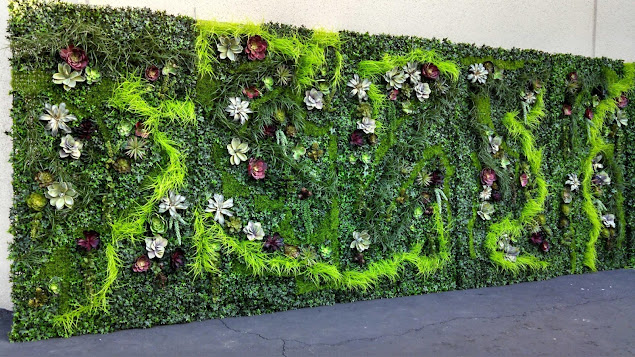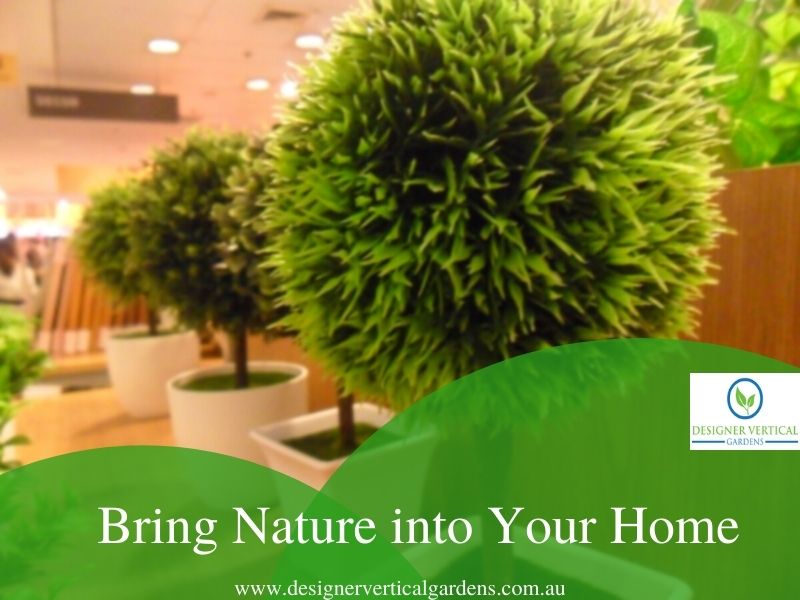Spruce Up and Beautify Your Walls with a Vertical Garden
Having vertical gardens is a wonderful thing: they add a riot of color to the background and purify the air, sometimes even providing nutrition.
Do you think it requires you
to live in a 20-floor building, to invent an impossibly high-tech irrigation
system, or to spend a fortune to create one?
Well, prepare to be surprised
because they can be grown to fit any budget, level of skill, or space.
You can turn a wall into a
vertical garden in a few easy steps:
Mesh of iron and wooden frame
Attach an iron mesh to a
wooden frame so that it stands firmly. You can create a vertical garden
by sticking a plastic sheet or board on the wall. Mold cannot grow on this
surface.
Once the plastic sheet is on
the wall, prepare 4-6 wooden blocks with the following dimensions: 10x5x5 cm.
The jute cloth used for the vertical garden's base will be attached to these.
The jute cloth needs to be at
least 20 cm larger than the wooden frame.
One end of the jute cloth
should be held on one top corner of the plastic sheet, and a woodblock should
be placed over it. Drill a nail through the woodblock. The jute cloth must be
firmly pressed between the plastic and woodblock.
On the same side, repeat this
step on the bottom corner. The size of your vertical garden will
determine how many blocks of wood you need.
Stretch out the jute cloth on
the other side. This is the most challenging part. The wooden blocks should be
drilled on this side so that they come up inside the cloth.
The distance between the
plastic sheet and the jute must be at least 5 cm (the width of your block). You
should invert the wooden block if you plan to plant plants with longer roots.
The bottom of the frame
should be secured with a wooden plank covered with thick plastic sheeting once
this has been done.
Attach the iron mesh frame to
the jute base. Add a mixture of soil, compost, and coco peat to the jute base.
Through the iron mesh and
holes of the jute cloth, plant the seeds at an appropriate distance. Make sure
the seeds are regularly watered.
Organize
your vertical garden
Making a vertical garden
will be a breeze if you have a fence or wall that can accommodate hooks.
You can upcycle metal or
plastic containers into plant pots and hang them on walls or fences. Ensure
that the bottom of the pots has holes so that water can drain out.
Alternatively, if you do not have a fence or wall, drill L-angles on each side
of the wall or rod holders on both sides. Connect them using a curtain rod,
wooden stick, or thin PVC pipe. Place your plants on them.
Make sure that you can
comfortably reach the highest rod. You can place the lowest rod on the ground
or about one foot above it.
With hanging organizers, you can place wall hanging plants
Old shoe organizers or baby
accessories organizers can be turned into beautiful gardens. Fix them to a wall
with nails so the plants can weigh them down. Plant small saplings in each
pocket of soil and cocopeat, and voila you are done!
Organizers must be made of
strong fabric or materials. Choose plants that do not spread too much and do
not require much soil or water to grow. Such compact pockets are ideal for
growing herbs such as rosemary, basil, and chives.
Pipes made from PVC
PVC pipes make excellent
bases for vertical gardens. They are also relatively easy to make if you have
the right equipment.
Drill steel pipe holders at
regular intervals on the designated wall. At each end, there should be a
holder, and at least two in the middle (depending on the length of the pipe).
Ensure they are perfectly aligned.
PVC pipes should be cut in
half vertically. So that they remain in place, carefully place them over the
holders and drill screws. If you like, you can continue to add rows vertically.
If you are thinking about
making your office or home space look amazing with artificial wall-hanging plants, you can visit Designer Vertical Gardens. You can choose from
a variety of products according to your needs and decor style.




Comments
Post a Comment